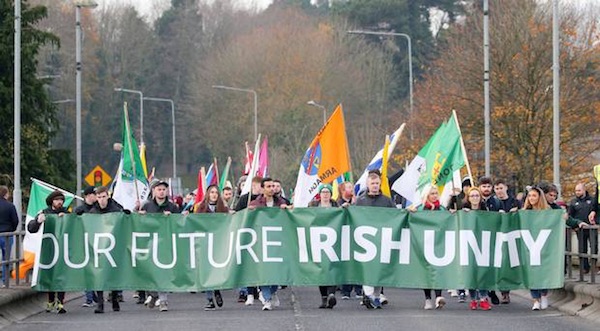
Thousands of people took to the streets of County Donegal and County Tyrone last weekend to demand a united Ireland.
Republicans of all shades - from Sinn Féin to the Irish Republican Socialist Party (IRSP) to members of the 32 County Sovereignty Movement - marched as one from Lifford in Donegal across the border into Strabane, calling for “Irish unity now”.
They were welcomed into Strabane town centre in Tyrone by a traditional Irish band. Many of those taking part waved tricolours, the Starry Plough, Basque, Catalonian and various county flags.
Organisers stressed the march was a “non-party, non-political, non-sectarian, peaceful march”. Liam Sweeney, chairman of Strabane Gaelic sports club, addressed those gathered, reiterating he had “absolutely no political affiliation to any political party” but that he wanted to build a new, united Ireland.
“I am a proud Irishman, a proud Gael, proud of where I come from. Our message is a simple one,” he said. “If the unity community can come together to co-operate on our common goal, we can successfully tackle any issues we face.
“Using our collective people power we can build a new, united, Irish republic that cherishes all of its children equally. By connecting people and showing solidarity with each other, we can transform Irish society and end the partition of Ireland.
“Partition has failed generations of Irish people, wreaking havoc on border communities. This town has been decimated by it over the years. Partition has prevented our entire island from reaching its true social, economic and cultural potential. A partitioned Ireland can only perpetuate the cycle of division. We aim to unite Ireland and its people.”
Irish language activist Grian Ní Dhaimhín spoke of a new generation of Irish speakers rising up and fighting for their rights. “The rights that we seek were promised to us via an Irish Language Act in the St Andrews Agreement in 2006 when I was only nine years old,” she said.
“But today, nearly 14 years later, neither Stormont or the British Government have delivered those rights. They have continued to maintain the six counties as a cold place for the Irish language.
“But Ireland is now witnessing a growth of a new generation of young Gaeilgeoirs, galvanised and organised to claim back the rights that were taken from us and denied to us. This new generation of Gaels is both challenging the state and building the society we want to see.”
One march organiser, Independent Derry and Strabane councillor Paul Gallagher, dismissed the unionist suggestion that Irish reunification is “a fantasy”.
“This was a unity march and looking around you can see that unity happened,” he told Derry-based journalist Leona O’Neill.
“There are various shades of republicanism, ordinary people, families here today. This was a localised parade in the sense that we wanted it as a first step. It has proved very successful and you will see this moving across Ireland as the beginning of a new movement.
“To those who criticise this march, when you see thousands of people turning up on this single issue, and a lot of people don’t see eye to eye on everything, that tells you it is not fantasy,” he said.
LOYALIST BACKS DEBATE
One former loyalist paramilitary agrees. Former UVF commander Billy Hutchinson says unionists should debate a united Ireland, even if they do not want one.
A survey this week found that a majority of people in the 26 Counties would like to see such a referendum in the next five years. A date of May 22, 2023 for a border poll has already been proposed, 25 years on from the referendum ratifying the Good Friday Agreement.
Unionism cannot “bury its head in the sand like an ostrich” over the prospect of an Irish unity referendum, Mr Hutchinson wrote. He said political unionism does not even want to discuss the prospect of a border poll, but must do so as one is inevitable in the long term.
“Unfortunately political unionism doesn’t want to negotiate around a united Ireland, and neither do I, but I want to hear what political unionism has to say about all of these issues.”
Mr Hutchinson predicted that unionists would win a border poll if it was held tomorrow, but might not win later polls given the demographic changes in the North.
Sinn Féin president Mary Lou McDonald has said such a poll should only be called after the appropriate “spade work” deciding what a united Ireland would look like has been carried out. She said this planning would take around two years to complete and called on the Dublin government to convene a forum to discuss the issue.
Sinn Féin has also been calling for the establishment of an all-Ireland Citizens’ Assembly to discuss the potential for Irish unity. Taoiseach Leo Varadkar has said he would “not rule out” such an assembly but questioned whether unionists living in the Six Counties would take part in it.
Despite reports her party colleague Nigel Dodds said it would, DUP leader Ms Foster told the BBC’s Radio Ulster that her party was ruling out participation in an all-island Assembly.
“We will not be involving ourselves in any all-Ireland civic forum because we believe in the Union,” she said.
![[Irish Republican News]](https://republican-news.org/graphics/title_gifs/rn.gif)
![[Irish Republican News]](https://republican-news.org/graphics/title_gifs/harp.gif)

